I’m happy to once again receive a Google Open Source Peer Bonus. The second this year, the fourth time in total. In addition to this “certificate”, I also got 500 USD.
Previously also received in April 2023, April 2020 and December 2011.
I’m happy to once again receive a Google Open Source Peer Bonus. The second this year, the fourth time in total. In addition to this “certificate”, I also got 500 USD.
Previously also received in April 2023, April 2020 and December 2011.
I was invited, and I have accepted, to become a member of Polhemsrådet, the “Polhem Council”, that works for the Polhem Prize nomination committee and serves to appoint the award winners.
I consider it a great honor to get to serve on this board. I am not an engineer by education, but I do know my way around a few engineer topics and in particular things around software and computer related technologies.
This assignment is done on a voluntary basis, there is no money involved. I am joining a council chock-full of intimidatingly impressive people as its seventh member.
The Polhem Prize, which I was awarded in 2017, is Sweden’s oldest engineering award. It was first awarded a person in 1878.
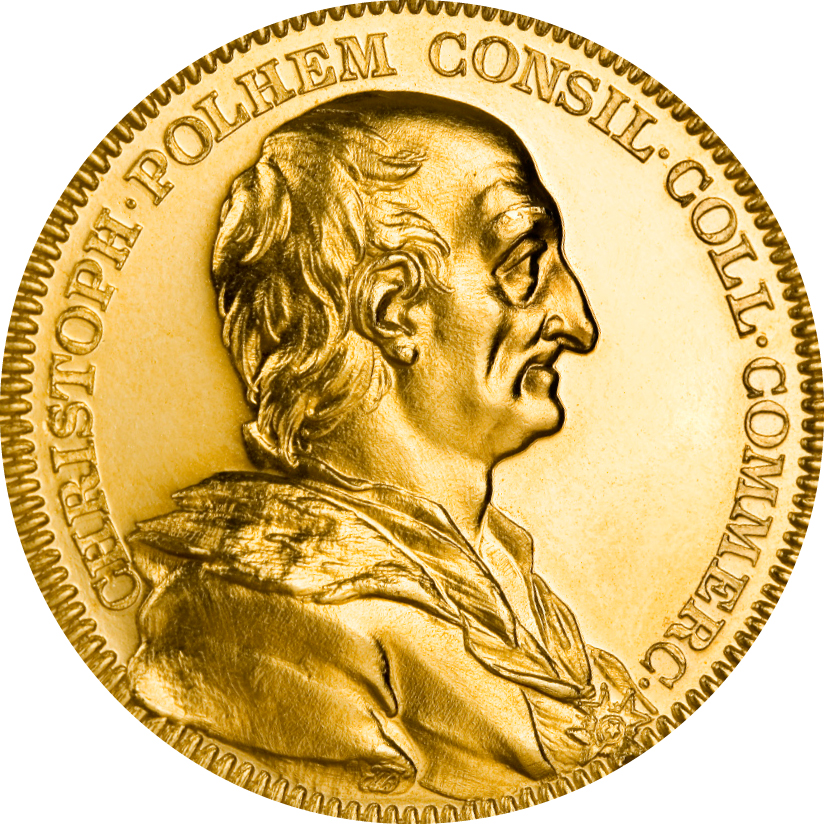
The Polhem Prize is awarded for “a [Swedish] high-level technical innovation or an ingenious solution to a technical problem. The innovation must be available on the open market and be competitive. It has to be sustainable and environmentally friendly.”
More details about the prize, how it works and other council members can be found on the Swedish site for Polhemspriset.
I am honored to yet again receive a peer bonus award from Google. This is a Google program for which persons like me can be nominated by Googlers and as a result receive grants.
I previously received such an award in 2020.
A few people noticed and have commented on the fact that this letter is signed by Chris DiBona and dated April 19th 2023, while sources say he was let go from Google back in January. Which means one or two of those things are wrong.
“The GitHub Stars program thanks GitHub’s most influential developers and gives them a platform to showcase their work, reach more people, and shape the future of GitHub.”
That’s a quote from stars.github.com. In the beginning of June 2021 I was invited into the program. I consider it an honor to be recognized. See my featured profile.
The stars program provides insights into and early access to members about what GitHub is working on next and allows me to channel back feedback on such things.
As someone who basically lives on GitHub I believe this could be useful and productive. GitHub is the first site I visit in the morning and the last one I view before I go to bed at night.
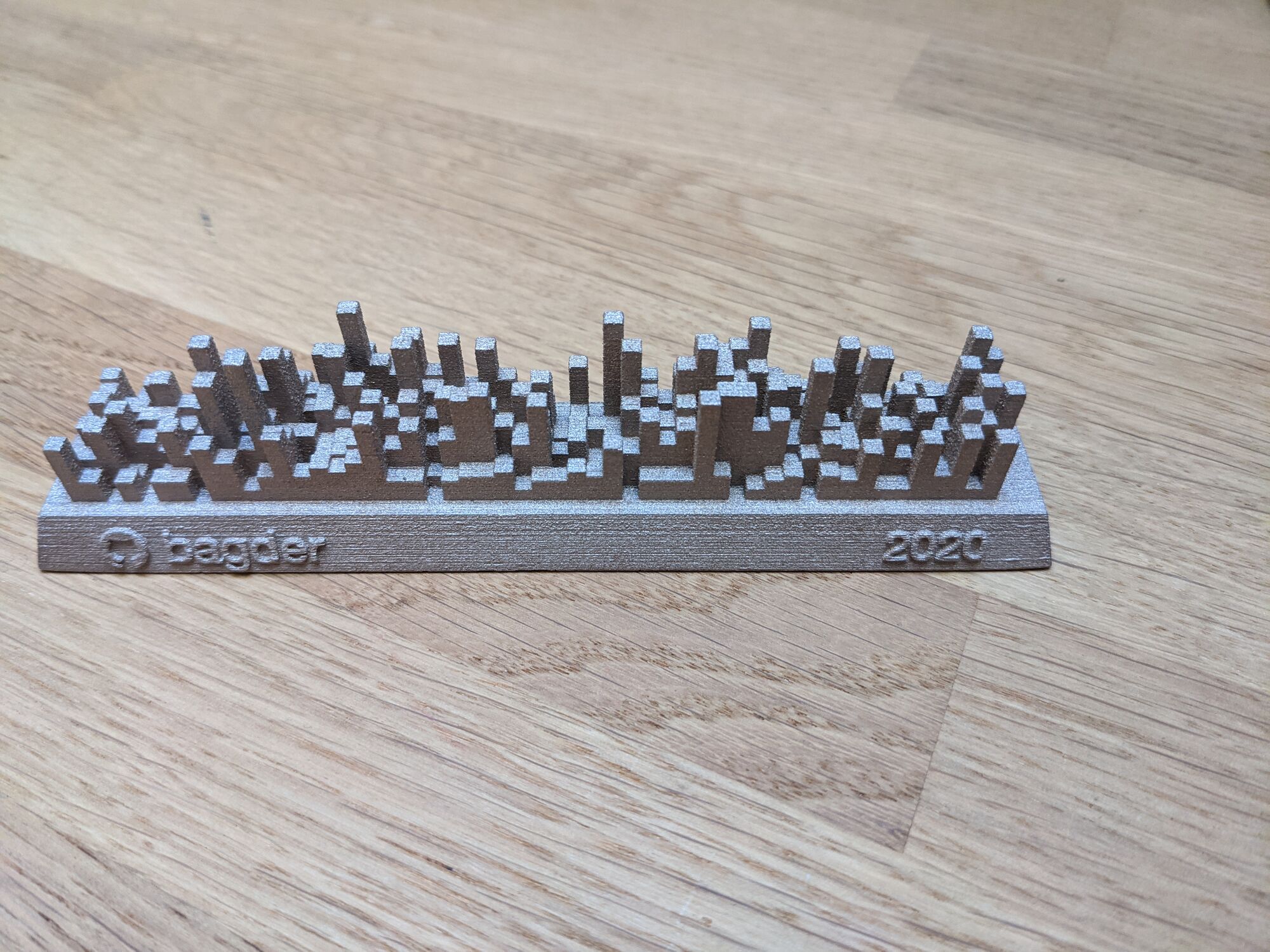
I got coasters and a pint glass saying “100 million repositories” some years back, I got my 3D-printed contribution graph in steel and I got a GitHub notebook at a conference once.
Today a delivery guy arrived at my door and I unpacked this 20x30x5 cm dark wooden box with a transparent plastic front showing a very shiny GitHub star and a similar shiny plaque saying
Daniel Stenberg
@bagder
Presented with <3 by GitHub in 2021
The thing is beautiful and will get an honorary placement in my house.
On this thick paper that came with the “starbox”, the following text was printed
Congratulations Daniel Stenberg!
We are pleased to present you with your 2021 GitHub Stars award!
Thank you for the tremendous work that you do in the community by inspiring, educating and influencing all those around you. You are a true star in our eyes, which is why we wanted to say ‘Thank you’ and recognize you as part of a select band of volunteer GitHub Stars from across the world. Together we are supporting communities where more than 60 million people learn, share, and work together to build software. We’re helping make a welcome and inclusive home for all developers and helping others to join us as the next generation.
So thank you for your passion, your love for sharing your knowledge, for your support of open source communities, the amazing things that you’ve done, and the exciting things to follow!
Again, congratulations on your GitHub Stars Award!
With <3 from GitHub
The day after, this second package arrived that was shock full of GitHub swag,
Today, exactly three years ago, I received flowers, money and a gold medal at a grand prize ceremony that will forever live on in my mind and memory. I was awarded the Polhem Prize for my decades of work on curl. The prize itself was handed over to me by no one else than the Swedish king himself. One of the absolute top honors I can imagine in my little home country.
In some aspects, my life is divided into the life before this event and the life after. The prize has even made little me being presented on a poster in the Technical Museum in Stockholm. The medal itself still sits on my work desk and if I just stop starring at my monitors for a moment and glance a little over to the left – I can see it. I think the prize made my surroundings, my family and friends get a slightly different view and realization of what I actually do all these hours in front of my screens.
In the tree years since I received the prize, we’ve increased the total number of contributors and authors in curl by 50%. We’ve done over 3,700 commits and 25 releases since then. Upwards and onward.
Life moved on. It was not “peak curl”. There was no “prize curse” that left us unable to keep up the pace and development. It was possibly a “peak life moment” there for me personally. As an open source maintainer, I can’t imagine many bigger honors or awards to come my way ever again, but I’m not complaining. I got the prize and I still smile when I think about it.
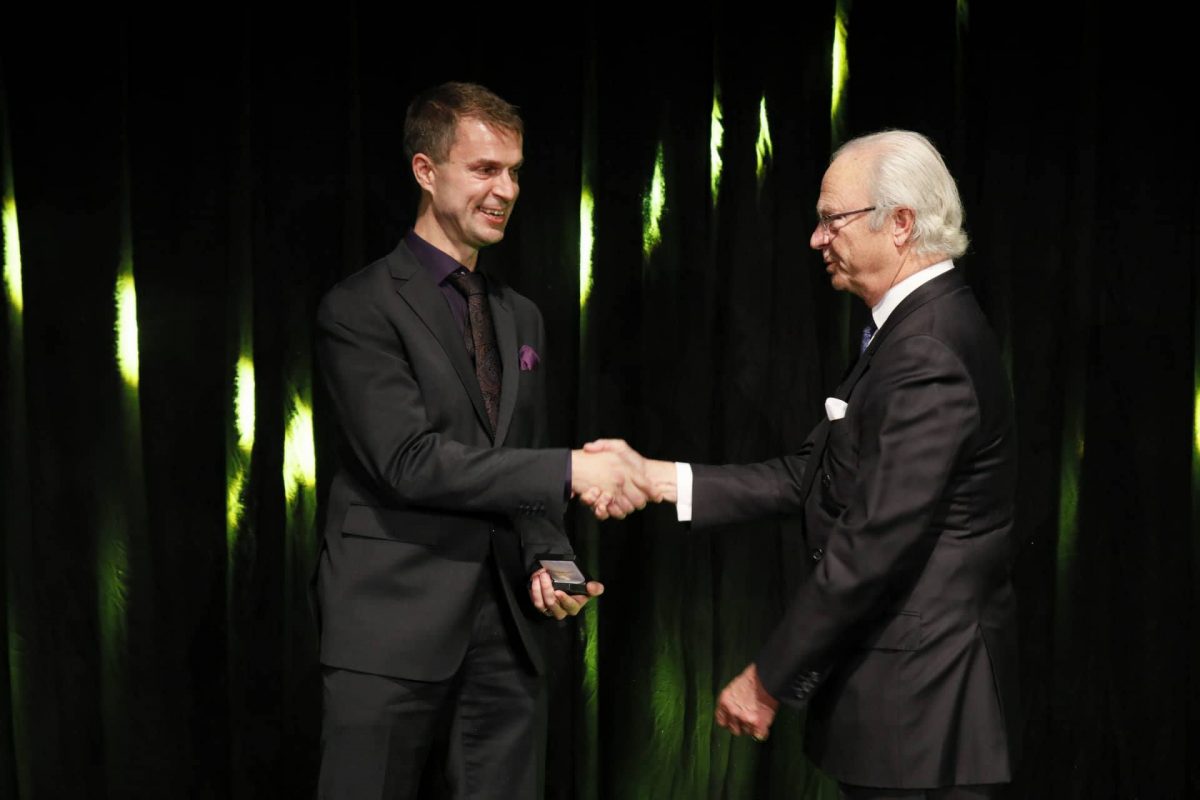
Earlier this year I was the recipient of a monetary Google patch grant with the expressed purpose of improving security in libcurl.
This was an upfront payout under this Google program describing itself as “an experimental program that rewards proactive security improvements to select open-source projects”.
I accepted this grant for the curl project and I intend to keep working fiercely on securing curl. I recognize the importance of curl security as curl remains one of the most widely used software components in the world, and even one that is doing network data transfers which typically is a risky business. curl is responsible for a measurable share of all Internet transfers done over the Internet an average day. My job is to make sure those transfers are done as safe and secure as possible. It isn’t my only responsibility of course, as I have other tasks to attend to as well, but still.
Security is already and always a top priority in the curl project and for myself personally. This grant will of course further my efforts to strengthen curl and by association, all the many users of it.
When security comes up in relation to curl, some people like to mention and propagate for other programming languages, But curl will not be rewritten in another language. Instead we will increase our efforts in writing good C and detecting problems in our code earlier and better.
Things we have done lately and working on to enforce everywhere:
String and buffer size limits – all string inputs and all buffers in libcurl that are allowed to grow now have a maximum allowed size, that makes sense. This stops malicious uses that could make things grow out of control and it helps detecting programming mistakes that would lead to the same problems. Also, by making sure strings and buffers are never ridiculously large, we avoid a whole class of integer overflow risks better.
Unified dynamic buffer functions – by reducing the number of different implementations that handle “growing buffers” we reduce the risk of a bug in one of them, even if it is used rarely or the spot is hard to reach with and “exercise” by the fuzzers. The “dynbuf” internal API first shipped in curl 7.71.0 (June 2020).
Realloc buffer growth unification – pretty much the same point as the previous, but we have earlier in our history had several issues when we had silly realloc() treatment that could lead to bad things. By limiting string sizes and unifying the buffer functions, we have reduced the number of places we use realloc and thus we reduce the number of places risking new realloc mistakes. The realloc mistakes were usually in combination with integer overflows.
Code style – we’ve gradually improved our code style checker (checksrc.pl) over time and we’ve also gradually made our code style more strict, leading to less variations in code, in white spacing and in naming. I’m a firm believer this makes the code look more coherent and therefore become more readable which leads to fewer bugs and easier to debug code. It also makes it easier to grep and search for code as you have fewer variations to scan for.
More code analyzers – we run every commit and PR through a large number of code analyzers to help us catch mistakes early, and we always remove detected problems. Analyzers used at the time of this writing: lgtm.com, Codacy, Deepcode AI, Monocle AI, clang tidy, scan-build, CodeQL, Muse and Coverity. That’s of course in addition to the regular run-time tools such as valgrind and sanitizer builds that run the entire test suite.
Memory-safe components – curl already supports getting built with a plethora of different libraries and “backends” to cater for users’ needs and desires. By properly supporting and offering users to build with components that are written in for example rust – or other languages that help developers avoid pitfalls – future curl and libcurl builds could potentially avoid a whole section of risks. (Stay tuned for more on this topic in a near future.)
Recognizing that whatever we do and however tight ship we run, we will continue to slip every once in a while, is important and we should make sure we find and fix such slip-ups as good and early as possible.
Raising bounty rewards. While not directly fixing things, offering more money in our bug-bounty program helps us get more attention from security researchers. Our ambition is to gently drive up the reward amounts progressively to perhaps multi-thousand dollars per flaw, as long as we have funds to pay for them and we mange keep the security vulnerabilities at a reasonably low frequency.
More fuzzing. I’ve said it before but let me say it again: fuzzing is really the top method to find problems in curl once we’ve fixed all flaws that the static analyzers we use have pointed out. The primary fuzzing for curl is done by OSS-Fuzz, that tirelessly keeps hammering on the most recent curl code.
Good fuzzing needs a certain degree of “hand-holding” to allow it to really test all the APIs and dig into the dustiest corners, and we should work on adding more “probes” and entry-points into libcurl for the fuzzer to make it exercise more code paths to potentially detect more mistakes.
See also my presentation testing curl for security.
I’m honored to – once again – be a recipient of this award Google hands out to open source contributors, annually. I was previously awarded this in 2011.
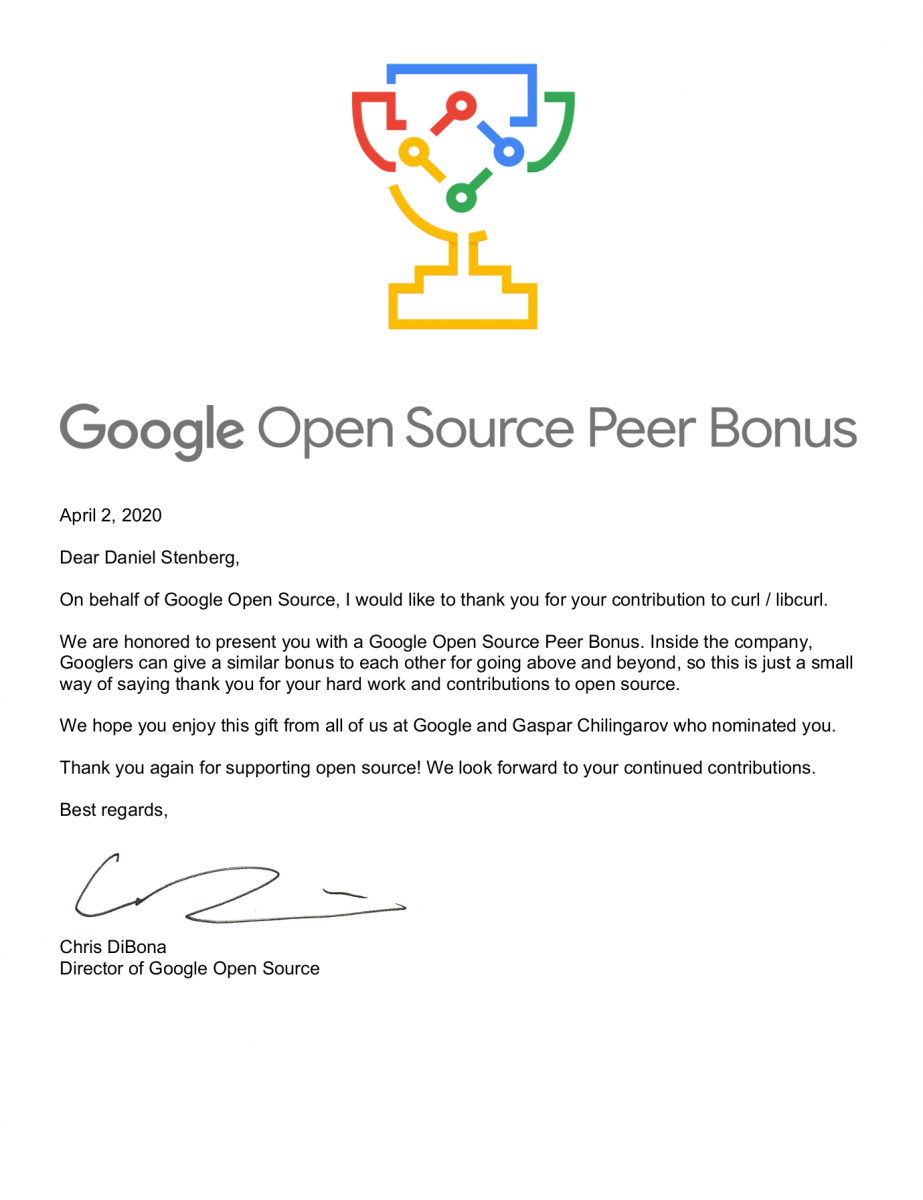
I don’t get a lot of awards. Getting this token of appreciation feels awesome and I’m humbled and grateful I was not only nominated but also actually selected as recipient. Thank you, Google!

Nine years ago I got 350 USD credits in the Google store and I got my family a set of jackets using them – my kids have grown significantly since then, so to them those black beauties are now just a distant memory, but I still actually wear mine from time to time!
This time, the reward comes with a 250 USD “payout” (that’s the gift mentioned in the mail above), as a real money transfer that can be spent on other things than just Google merchandise!
I’ve decided to accept the reward and the money and I intend to spend it on beer and curl stickers for my friends and fans. As I prefer to view it:
The Google Open Source Beer Bonus.
Thank you Google and thank you Gaspar!
Update: the Google Open Source blog post about it.
On September 25th 2017, I received the email that first explained to me that I had been awarded the Polhem Prize.
Du har genom ett omfattande arbete vaskats fram som en värdig mottagare av årets Polhemspris. Det har skett genom en nomineringskommitté och slutligen ett råd med bred sammansättning. Priset delas ut av Kungen den 19 oktober på Tekniska muséet.
My attempt of an English translation:
You have been selected as a worthy recipient of this year's Polhem prize through extensive work. It has been through a nomination committee and finally a council of broad composition. The prize is awarded by the King on October 19th at the Technical Museum.
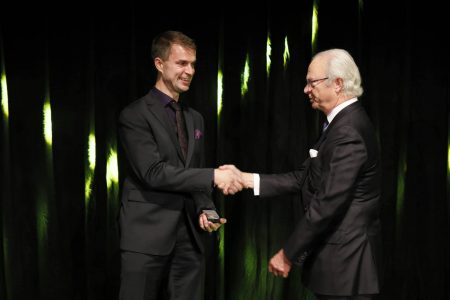 At the award ceremony in October 2017 I received the gold medal at the most fancy ceremony I could ever wish for, where I was given the most prestigious award I couldn’t have imagined myself even being qualified for, handed over by no other than the Swedish King.
At the award ceremony in October 2017 I received the gold medal at the most fancy ceremony I could ever wish for, where I was given the most prestigious award I couldn’t have imagined myself even being qualified for, handed over by no other than the Swedish King.
An entire evening with me in focus, where I was the final grand finale act and where my life’s work was the primary reason for all those people being dressed up in fancy clothes!
Things have settled down since. The gold medal has started to get a little dust on it where it lies here next to me on my work desk. I still glance at it every once in a while. It still feels surreal. It’s a fricking medal in pure gold with my name on it!
I almost forget the money part of the prize. I got a lot of money as well, but in retrospect it is really the honors, that evening and the gold medal that stick best in my memory. Money is just… well, money.
So did the award and prize make my life any different? Yes sure, a little, and I’ll tell you how.
My closest surrounding of friends and family got a better understanding of what I’ve actually been doing all these long hours, all these years and more than one phrase in the style of “oh, so you actually did something useful?!” have been uttered.
Certainly I’ve tried to explain to them before, but nothing works as good as a gold medal from an award committee to say that what I do is actually appreciated “out there” and it has made a serious impact on the world.
I think I’m considered a little less weird now when I keep spending night hours in front of my computer when the house is otherwise dark and silent. Well, maybe still weird, but at least my weirdness has proven to result in something useful for mankind and that’s more than many other sorts of weird do… We all have hobbies.
Family and friends have gotten a rudimentary level of understanding of what curl is and what it does. I’m not suggesting they fully grasp it or know what an “internet protocol” is now, but at least a lot of people understand that it works with “internet transfers”. It’s not like people were totally uninterested before, but when I was given this prize – by a jury of engineers no less – that says this is a significant invention and accomplishment with a value that “can not be overestimated“, it made them more interested. The little video that was produced helped:
People in general still have a hard time to grasp the reach of the project, how much time I’ve spent so far on it, how I can find motivation to keep up the work and not the least how this is all given away for free for everyone.
The simple fact that these are all questions that I’ve been asked I think is a small reward in itself. I think the fact that I was awarded this prize for my work on Open Source is awesome and I feel honored to be a person who introduces this way of thinking to some of the people who previously would think that you have to sell proprietary things or earn a lot of money for your products in order to impact and change society as a whole.
The Polhem prize is not widely known in Sweden among the general populace and thus neither is the fact that I won it. Only a very special subset of people know about this. Of course it is even less known outside of Sweden and in fact the information about the prize given in English is very sparse.
The other day I received my invitation to participate in this year’s award ceremony on November 14. Of course I’ll happily accept that and I will be there and celebrate the winner this year!
How did the prize affect the project itself, the project that I was awarded for having cared for this long?
It hasn’t affected it much at all (as far as I can tell). The project has moved along like before and we’ve worked on fixing bugs and added features and cool things over time after my award just as we did before it. That’s how it has felt like. Business as usual.
If anything, I think I might have gotten some renewed energy and interest in the project and the commit author statistics actually show that my commit frequency has gone up since around the time I got the award. Our gitstats show that I’ve done more than half of the commits every single month the last year, most of this time even more than 70% of the commits.
I may have served twenty years here, but I’m not done yet!
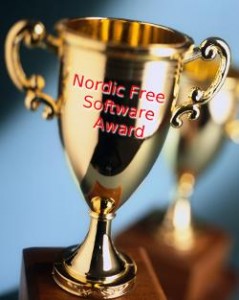 Remember the glorious year 2009 when I won the Nordic Free Software Award?
Remember the glorious year 2009 when I won the Nordic Free Software Award?
This award tradition that was started in 2007 was put on a hiatus after 2010 (I believe) and there has not been any awards handed out since, and we have not properly shown our appreciation for the free software heroes of the Nordic region ever since.
The award has now been reignited by Jonas Öberg of FSFE and you’re all encourage to nominate your favorite Nordic free software people!
Go ahead and do it right away! You only have to the end of February so you better do it now before you forget about it.
I’m honored to serve on the award jury together with previous award winners.
This year’s Nordic Free Software Award winner will be announced and handed their prize at the FOSS-North conference on April 23, 2018.
(Okay, yes, the “photo” is a montage and not actually showing a real trophy.)
I’m about to take an extended vacation for the rest of the year and into the beginning of the next, so I decided I’d sum up the year from a curl angle already now, a few weeks early. (So some numbers will grow a bit more after this post.)
So what did we do this year in the project, how did curl change?
The first curl release of the year was version 7.53.0 and the last one was 7.57.0. In the separate blog posts on 7.55.0, 7.56.0 and 7.57.0 you’ll note that we kept up adding new goodies and useful features. We produced a total of 9 releases containing 683 bug fixes. We announced twelve security problems. (Down from 24 last year.)
At least 125 different authors wrote code that was merged into curl this year, in the 1500 commits that were made. We never had this many different authors during a single year before in the project’s entire life time! (The 114 authors during 2016 was the previous all-time high.)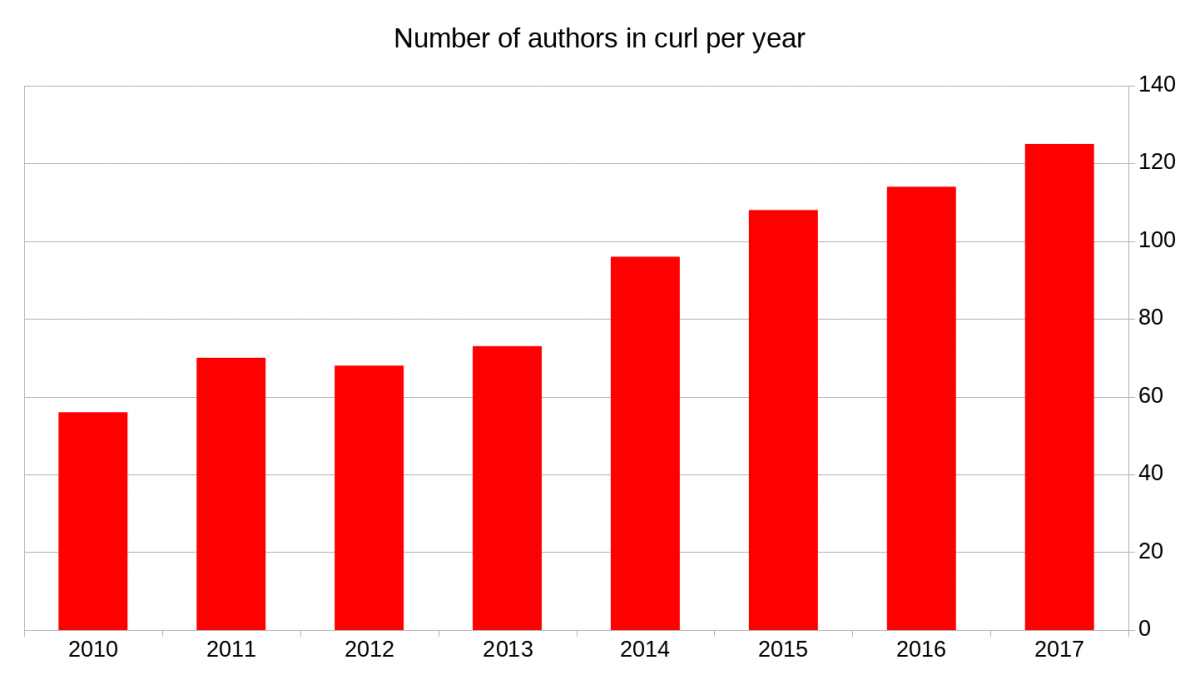
We added more than 160 new names to the THANKS document for their help in improving curl. The total amount of contributors is now over 1660.
This year we truly started to use travis for CI builds and grew from a mere two builds per commit and PR up to nineteen (with additional ones run on appveyor and elsewhere). The current build set is a very good verification that that most things still compile and work after a PR is merged. (see also the testing curl article).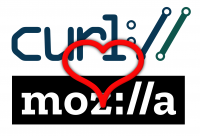
Mozilla announced that they too will use colon-slash-slash in their logo. Of course we all know who had it that in their logo first… =)
In March 2017, we had our first ever curl get-together as we arranged curl up 2017 a weekend in Nuremberg, Germany. It was very inspiring and meeting parts of the team in real life was truly a blast. This was so good we 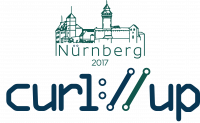 intend to do it again: curl up 2018 will happen.
intend to do it again: curl up 2018 will happen.
curl turned 19 years old in March. In May it surpassed 5,000 stars on github.
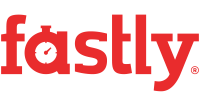 Also in May, we moved over the official curl site (and my personal site) to get hosted by Fastly. We were beginning to get problems to handle the bandwidth and load, and in one single step all our worries were graciously taken care of!
Also in May, we moved over the official curl site (and my personal site) to get hosted by Fastly. We were beginning to get problems to handle the bandwidth and load, and in one single step all our worries were graciously taken care of!
We got curl entered into the OSS-fuzz project, and Max Dymond even got a reward from Google for his curl-fuzzing integration work and thanks to that project throwing heaps of junk at libcurl’s APIs we’ve found and fixed many issues.
The source code (for the tool and library only) is now at about 143,378 lines of code. It grew around 7,057 lines during the year. The primary reasons for the code growth were:
Oh what an eventful year it has been for me personally.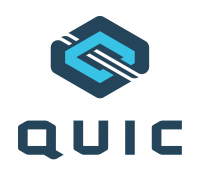
The first interim meeting for QUIC took place in Japan, and I participated from remote. After all, I’m all set on having curl support QUIC and I’ll keep track of where the protocol is going! I’ve participated in more interim meetings after that, all from remote so far.
I talked curl on the main track at FOSDEM in early February (and about HTTP/2 in the Mozilla devroom). I’ve then followed that up and have also had the pleasure to talk in front of audiences in Stockholm, Budapest, Jönköping and Prague through-out the year.
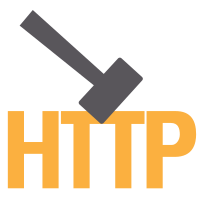 I went to London and “represented curl” in the third edition of the HTTP workshop, where HTTP protocol details were discussed and disassembled, and new plans for the future of HTTP were laid out.
I went to London and “represented curl” in the third edition of the HTTP workshop, where HTTP protocol details were discussed and disassembled, and new plans for the future of HTTP were laid out.
In late June I meant to go to San Francisco to a Mozilla “all hands” conference but instead I was denied to board the flight. That event got a crazy amount of attention and I received massive amounts of love from new and old friends. I have not yet tried to enter the US again, but my plan is to try again in 2018…
I wrote and published my h2c tool, meant to help developers convert a set of HTTP headers into a working curl command line.
The single occasion that overshadows all other events and happenings for me this year by far, was without doubt when I was awarded the Polhem Prize and got a gold medal medal from no other than his majesty the King of Sweden himself. For all my work and years spent on curl no less.
Not really curl related, but in November I was also glad to be part of the huge Firefox Quantum release. The biggest Firefox release ever, and one that has been received really well.
I’ve managed to commit over 800 changes to curl through the year, which is 54% of the totals and more commits than I’ve done in curl during a single year since 2005 (in which I did 855 commits). I explain this increase mostly on inspiration from curl up and the prize, but I think it also happened thanks to excellent feedback and motivation brought by my fellow curl hackers.
We’re running towards the end of 2017 with me being the individual who did most commits in curl every single month for the last 28 months.
More things to come!